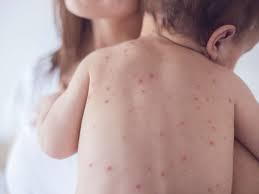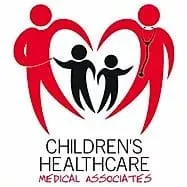
WHAT IS MEASLES?
Measles is a very contagious infection that causes a total body skin rash and flu like symptoms. Measles is rare in the United States thanks to widespread immunization. But millions of cases happen worldwide every year. Measles is caused by a virus, so there's no specific medical treatment for it. This virus has to run its course. A child who is sick should drink plenty of liquids, get lots of rest, and stay at home, daycare, and other community or group activities to prevent spreading the infection.
WHAT ARE THE SIGNS AND SYMPTOMS OF MEASLES?
The first symptoms of a measles infection are usually a hacking cough, runny nose, high fever, and red eyes. Kids also may have Koplik's spots (small red spots with blue-white centers) inside the mouth before the rash starts.
The rash breaks out 3-5 days after symptoms start, sometimes along with a high fever up to 104 degrees Fahrenheit. The red or reddish-brown rash usually begins as flat red spots on the forehead. It spreads to the rest of the face, then down the neck and torso to the arms, legs, and feet. The fever and rash slowly go away after a few days.
IS MEASLES CONTAGIOUS?
Measles is very contagious. In fact, 9 out of 10 people who aren't vaccinated for measles will get it if they are near an infected person.
HOW DO PEOPLE GET MEASLES?
Measles spreads when people breathe in or have direct contact with virus-infected fluid. It can pass through droplets sprayed into the air when someone with measles sneezes or coughs. Someone exposed to the virus usually shows symptoms 7-14 days later.
People with measles can spread the disease as early as 4 days before the rash starts, they're most contagious while they have a fever, runny nose, and cough. People with weak immune systems due to other conditions (like HIV and some cancers, or from being on some type of medicines) can spread the measles viruses longer, until they recover.
Since the largest number of patients contracting measles are outside of North America, the American Academy of Pediatrics, the World Health Organizations and the Center for Disease Control is strongly recommending that all unvaccinated children receive their MMR vaccine at least 3 weeks before traveling internationally.
HOW IS MEASLES TREATED?
There is no specific medical treatment for measles. To help manage symptoms:
Give your child plenty of fluids.
Encourage extra rest.
Give a non-aspirin fever medicine, such as acetaminophen or ibuprofen if a fever makes your child uncomfortable. Never give aspirin to a child or teen who has a viral illness, as such use is linked to Reye syndrome, which can be life-threatening.
Kids with measles should be closely watched. In some cases, measles can lead to other problems, such as
Ear infections
Croup
Diarrhea
Pneumonia
Encephalitis (irritation and swelling of the brain)
Children with measles should be kept away from others for 4 days after their rash appears. For those with a weak immune system, this should continue until they make a full recovery, and all symptoms are gone.
HOW LONG DOES MEASLES LAST?
A measles infection and the medical problems that may follow can last for several weeks in all.
CAN MEASLES BE PREVENTED?
The best way to protect your kids is to make sure there immunized against measles. For most kids, measles protection is part of the measles-mumps-rubella vaccine (MMR) or measles-mumps-rubella-varicella vaccine (MMRV) given when there 12 to 15 months old and again when they're 4to 6 years old. About 95% of people achieve immunity during their first vaccine, and the rest develop it the second time they're vaccinated. Immunity lasts a lifetime. The first vaccine can be given to babies as young as 6 months old if they will be travelling internationally. Talk to your doctor to see when the vaccine is needed.
WHY IS VACCINTAION IMPORTANT?
Widespread immunization has made measles rare in the U.S. However, there is currently an outbreak of Measles, including the U.S, the vast majority of patients are children who are not vaccinated.
For those of you who have talked to our clinicians about the value of the MMR and other vaccines will know that the job of the pediatricians is not to twist your arm or make you feel bad if you choose not to vaccinate your child. Instead, we feel that it is our responsibility as making sure that you and your spouse have all of the facts that the parents can make an educated decision. Here are the reasons that our providers feel it is important for all kids to get the vaccine on time:
- At highest risk during a measles outbreak are infants who aren't old enough to get the measles vaccine
- Nearly 1 to 3 of every 1,000 children who become infected with measles will die from respiratory and or neurologic complications.
- Most all public schools require that children be vaccinated to enter the school.
WHEN SHOULD I CALL THE DOCTOR?
Call the doctor right away if you think that your child has measles. Also call if your child was around someone who has measles, especially if your child:
- Is an infant.
- Is taking medicines that suppress the immune system.
- Has tuberculosis, cancer, or a disease that affects the immune system.
- Hasn't gotten 2 doses of the measles vaccine.
